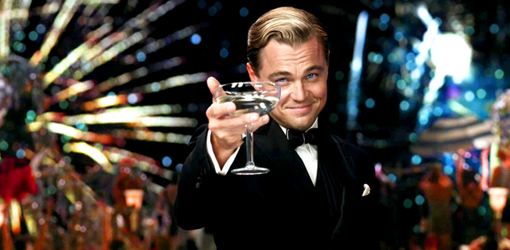Movie Review: The Great Gatsby
 At the height of the Roaring Twenties, young Nick Carraway (Tobey Maguire) takes up residence in a shack in one of New York state's wealthiest areas. Nick knows only two people in the area, his flighty cousin Daisy (Carey Mulligan) and her brutish husband Tom Buchanan (Joel Edgerton). Through this association, he becomes aware of the legendary parties that take place next door in the estate of the mysterious Jay Gatsby (Leonardo DiCaprio). When Nick is invited to one of these parties, he becomes acquainted with Gatsby and finds himself swept up in a lifestyle more lavish than he could have ever imagined. But Gatsby has an agenda and after setting up a meeting between his new friend and Daisy, he finds himself caught in the middle of a tangled in a deadly web that may destroy everything around him.
At the height of the Roaring Twenties, young Nick Carraway (Tobey Maguire) takes up residence in a shack in one of New York state's wealthiest areas. Nick knows only two people in the area, his flighty cousin Daisy (Carey Mulligan) and her brutish husband Tom Buchanan (Joel Edgerton). Through this association, he becomes aware of the legendary parties that take place next door in the estate of the mysterious Jay Gatsby (Leonardo DiCaprio). When Nick is invited to one of these parties, he becomes acquainted with Gatsby and finds himself swept up in a lifestyle more lavish than he could have ever imagined. But Gatsby has an agenda and after setting up a meeting between his new friend and Daisy, he finds himself caught in the middle of a tangled in a deadly web that may destroy everything around him.
I have been struggling with how to review The Great Gatsby since I saw it on opening night and I have finally come to the final conclusions:
1.) This novel is one of my very favorite literary works and in some regards this film brought a bit of it to life; 2.) Baz Luhrmann does not make films for me and as such, I was predisposed to disliking his vision for The Great Gatsby; 3.) There are parts of this film that I actually really liked but the more I think about it, the more I have come to the conclusion that they are all taken directly from the source material and therefore have less to do with the actual film itself than my aforementioned love for the novel; 4.) I don't think this movie is very good; 5.) I get why other people do think it is very good.
In the interest of fairness, let me start with the positives. Luhrmann put together an impressive cast filled with a number of people I really like (and Tobey Maguire too!) and while I don't think any of them give an awards-caliber performance, most of them are pretty solid, DiCaprio in particular. I very much enjoyed the use anachronistic music in The Great Gatsby and I don't always feel that way about a Luhrmann film. And as mentioned above, there are a few scenes in this film that are taken almost directly from the page and the translation is such that it reminded me just how much I really do love F. Scott Fitzgerald's writing.
Beyond these "pros", however, I found a lot of faults within The Great Gatsby. For one thing, I was thoroughly underwhelmed by the "spectacle" of the film and this caught me completely off guard. I do not particularly care for Moulin Rouge or Romeo + Juliet but I cannot deny the visual beauty of those films. I was sorely disappointed on that front here. I found the set design to be uninspiring, the costume and makeup to be only adequate, and the actual look of the film to be downright ugly. I was not swept away into the Roaring Twenties the way I needed to be to enjoy this film. I hated the hazy, out of focus way in which many of the scenes were shot and I'm not sure if this was purposeful or if this was the result of seeing a 3D movie in 2D but regardless, it was unappealing. And while the first half of the film at least has a solid energy to it, the back half is quite honestly boring (and again, I say this as someone who has a great affinity for this story). All of the grandiose, classic Luhrmann style is contained in the first hour while the second and third act are a slough to get through. I can't believe that I'm saying a Luhrmann film was too stoic and not nearly as overwhelmingly flamboyant as it needs to be but...well, that's the shocking truth.
These complaints would probably be enough to turn me off from this film but Luhrmann's translation of the novel also leaves something to be desired. He missed badly on Daisy, turning into a truly sympathetic character instead of showing her as the manipulative shrew she is in the book. Moreover, far too much about Jay Gatsby himself is given up or hinted at too strongly so early in the film that the final reveal of who he really is falls flat. The impact and the tragedy of his reality is not nearly as crushing as it should be. The mystery of Gatsby is what makes the novel so great and when you strip that away, the narrative suffers greatly. As such, I can only say that while the novel should be considered required reading for literally EVERYONE, this film version of The Great Gatsby holds little value for me. Grade: C (Rated PG-13 for some language, sexuality, and dramatic themes)


